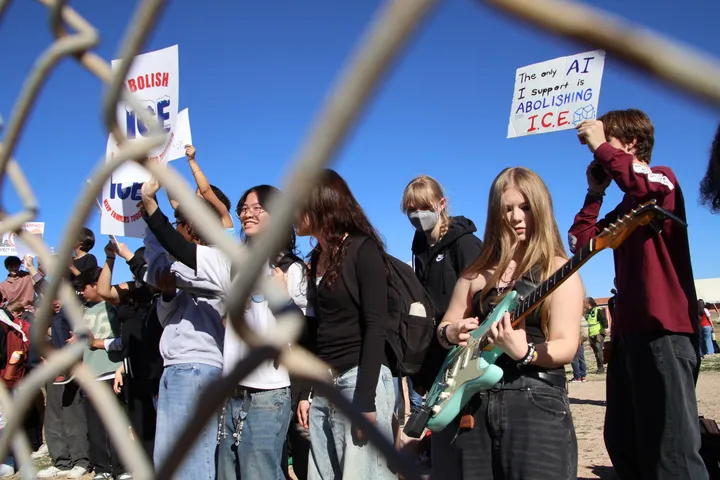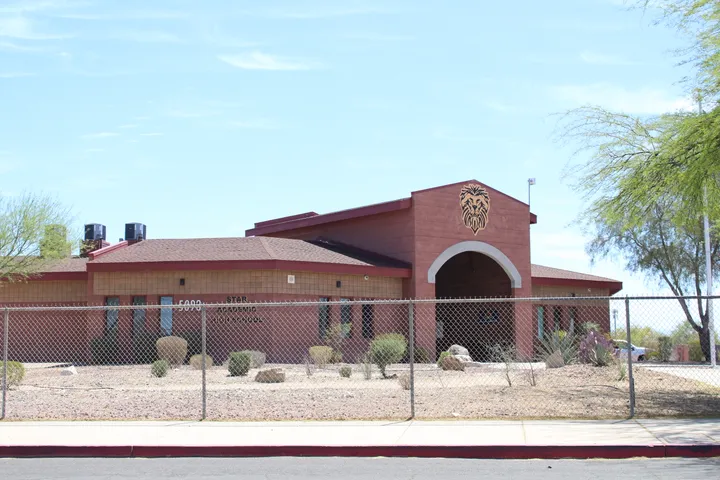As UA weighs Trump compact, campus organizing grows
Students, faculty and local leaders at the University of Arizona are stepping up organizing efforts as debate continues over the compact's potential impact on campus freedoms and diversity programs.
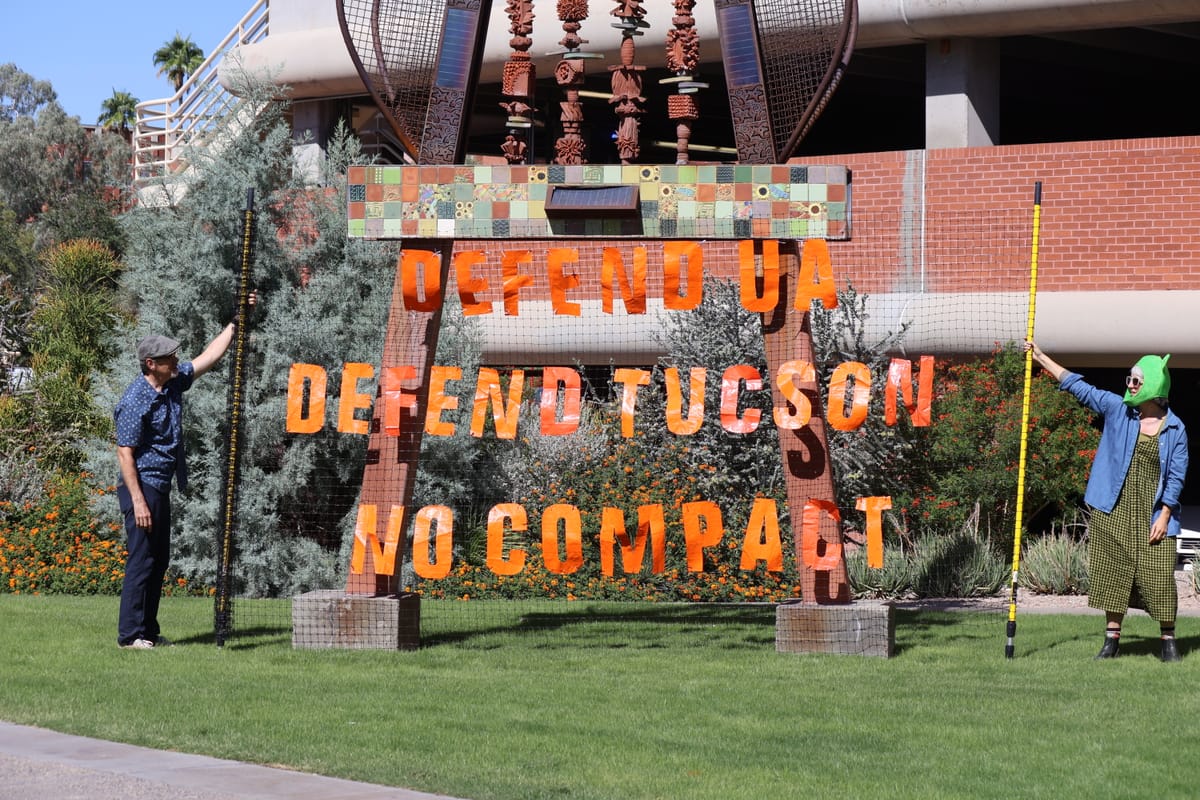
With a Monday deadline approaching for universities to respond to the Trump administration’s proposed Higher Education Compact, students and faculty at the University of Arizona have ramped up demonstrations this week, including a protest planned for Friday night, as debate intensifies over the plan’s potential impact on academic freedom and diversity programs.
The plan would tie federal funding to new compliance rules, prompting concerns about academic freedom and diversity programs. The UA was one of nine universities offered easier access to federal funds in exchange for agreeing to the compact, which includes a tuition freeze, a ban on race and sex considerations, and new limits on international students.
MIT became the first school to reject the compact on Oct. 10, after which it was offered to all higher education institutions nationwide. Brown University, another of the nine original schools, rejected the compact earlier this week, with the University of Southern California and the University of Pennsylvania following suit.
The UA released a statement Oct. 9 saying it will act in the best interests of students, faculty, staff and the state.
"We recognize that this proposal has generated a wide range of reactions and perspectives within our community and beyond," the statement said. "Working with the Arizona Board of Regents, we are thoroughly reviewing the compact to understand its full scope and implications. We are also engaging shared governance leaders representing faculty, staff and students, and other leaders across the state and nation to gather their input."
On Tuesday, the Associated Students of the University of Arizona held a press conference to formally announce its opposition to the compact and call on UA officials and the Arizona Board of Regents to publicly reject it.
“I see firsthand what makes this university so powerful. It’s people, our people. People from every walk of life, every identity, culture and belief,” said ASUA's Community Outreach and Belonging Director Rahel Hehn. “The letter states that American higher education is the envy of the world and represents a key strategy for our nation. This is true because of the bedrock of diversity that our country is built on.”
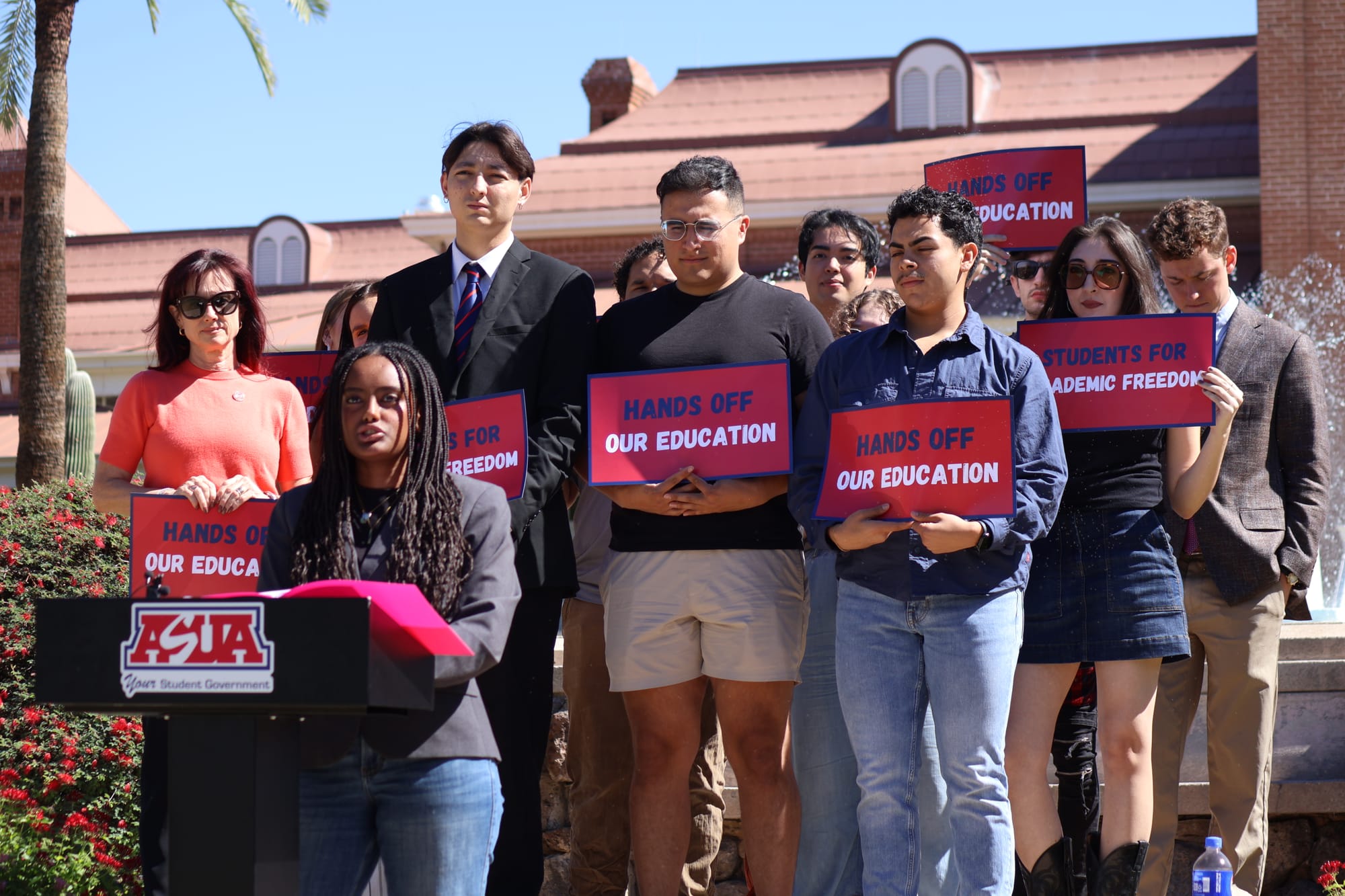
Hehn said as a land-grant and Hispanic-serving institution, the UA’s identity would be in jeopardy if it were to agree to the terms of the compact.
“This compact ties federal funding to political objectives, and that’s a threat we cannot accept,” she said.
Several other students called on President Suresh Garimella to reject the compact, saying it does not address real student concerns such as how they can afford rent or food.
“While the administration debates threats to conservatism or gender identity, students are skipping meals, dropping classes because they can’t afford rent and tuition in the same month, and struggling with the rising costs of groceries and gas,” said ASUA Senator at Large Eddie Barrón. “The real crisis on campus is being ignored, and we need leadership that responds to students’ basic needs, not fearmongering.”
Barrón said he would promote a resolution calling on the administration to reject the compact and “reaffirm its commitment to the values of equity, academic freedom and the student body.”
He said that growing up in Tucson, he’s seen students of color fight for their right to higher education and does not want to see those efforts go to waste.
“We are here today because of the movements that have come before us and that have fought to open these doors, and now it’s our turn, and the student body is here to make clear that we will not waver,” Barrón said.
Barrón said he learned about the compact from a local news outlet rather than the UA, and the news caught him completely off guard.
He said he represents more than 40,000 students attending the UA and wants to be able to answer their questions, but he was not offered that opportunity.
“I want to be able to provide a response and to have some acknowledgment from the university that this was going to happen. I think this is unbecoming of what this university is and what it should be and how it should be serving the students and faculty who call this campus home,” Barrón said.
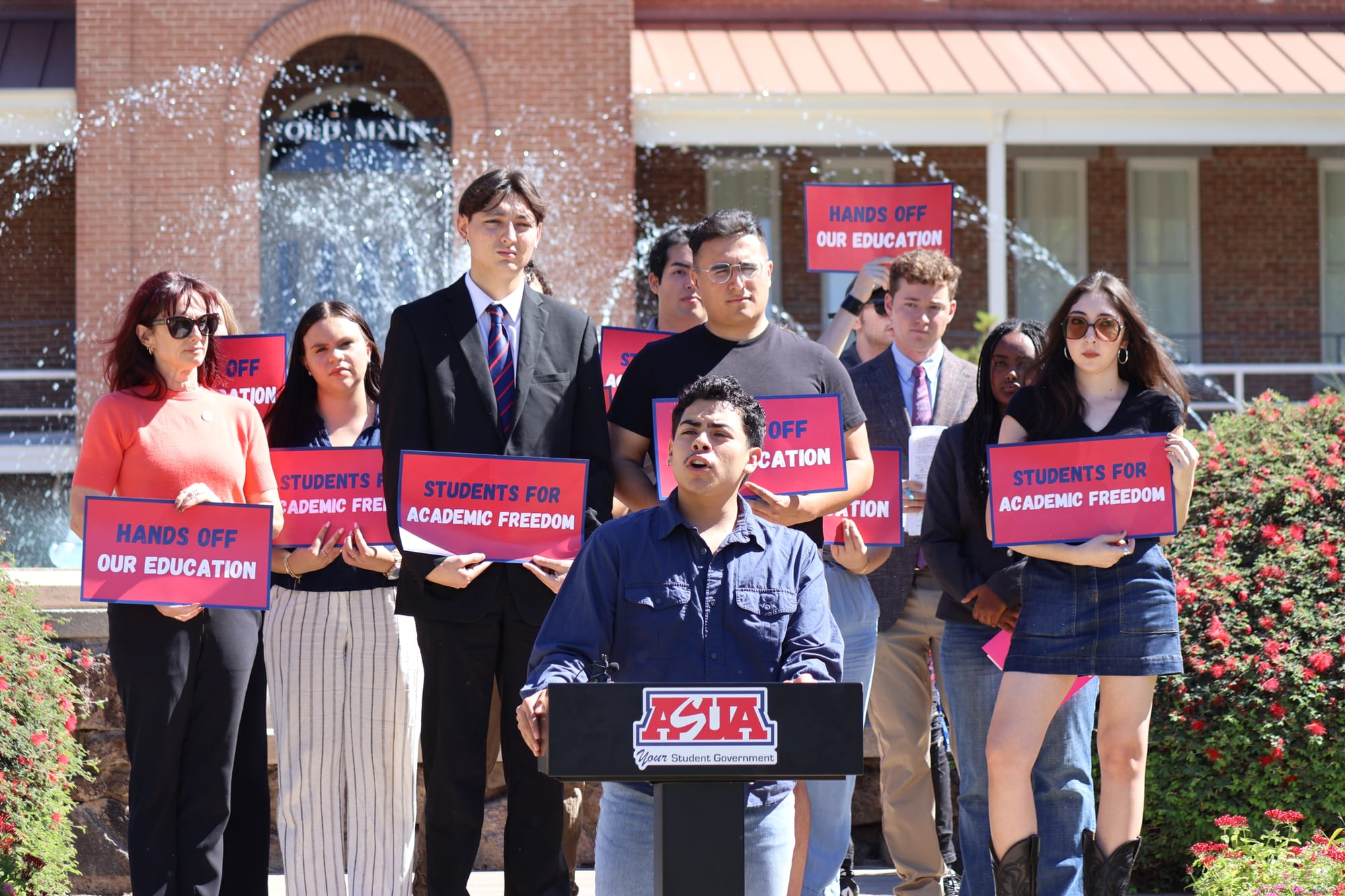
People need to stop looking at this as a party issue, Barrón said, adding that it’s unacceptable, regardless of ideology, for the government to impose on a university’s function.
“If we had a Democratic president right now demanding that the university follow its political agenda, there would be hell let loose on college campuses,” Barrón said.
Alyssa Norris, president of Planned Parenthood Generation Action and a representative of the UA’s Women and Gender Resource Center Student Council, said the UA has already restricted its cultural resource centers that benefited all students, regardless of identity.
“All of us are hurt by transphobia, misogyny, racism and xenophobia,” Norris said, warning about the future if UA does not make an effort to draw the line between what is acceptable and what is not. “Our compliance last spring opened the door for our compliance now, and our compliance now will open the door for compliance in the future.”
Norris said she worries about the future if UA keeps complying and wonders how much administrators consider outside voices.
"Now we’re wondering, are they going to keep not listening to us? Are they going to actually consider the voice of not just faculty, but the community?” Norris asked.
As a representative of the WGRC, Norris also worries about what the new designation of “biological sex” in the compact would mean for her group.
“It is called ‘Women and Gender’ because it includes individuals who lie outside the binary, lie outside of being cisgender, and so trying to impose incorrect and unscientific declarations of what sex and gender is completely disrespects and undermines all the work that we do,” Norris said.
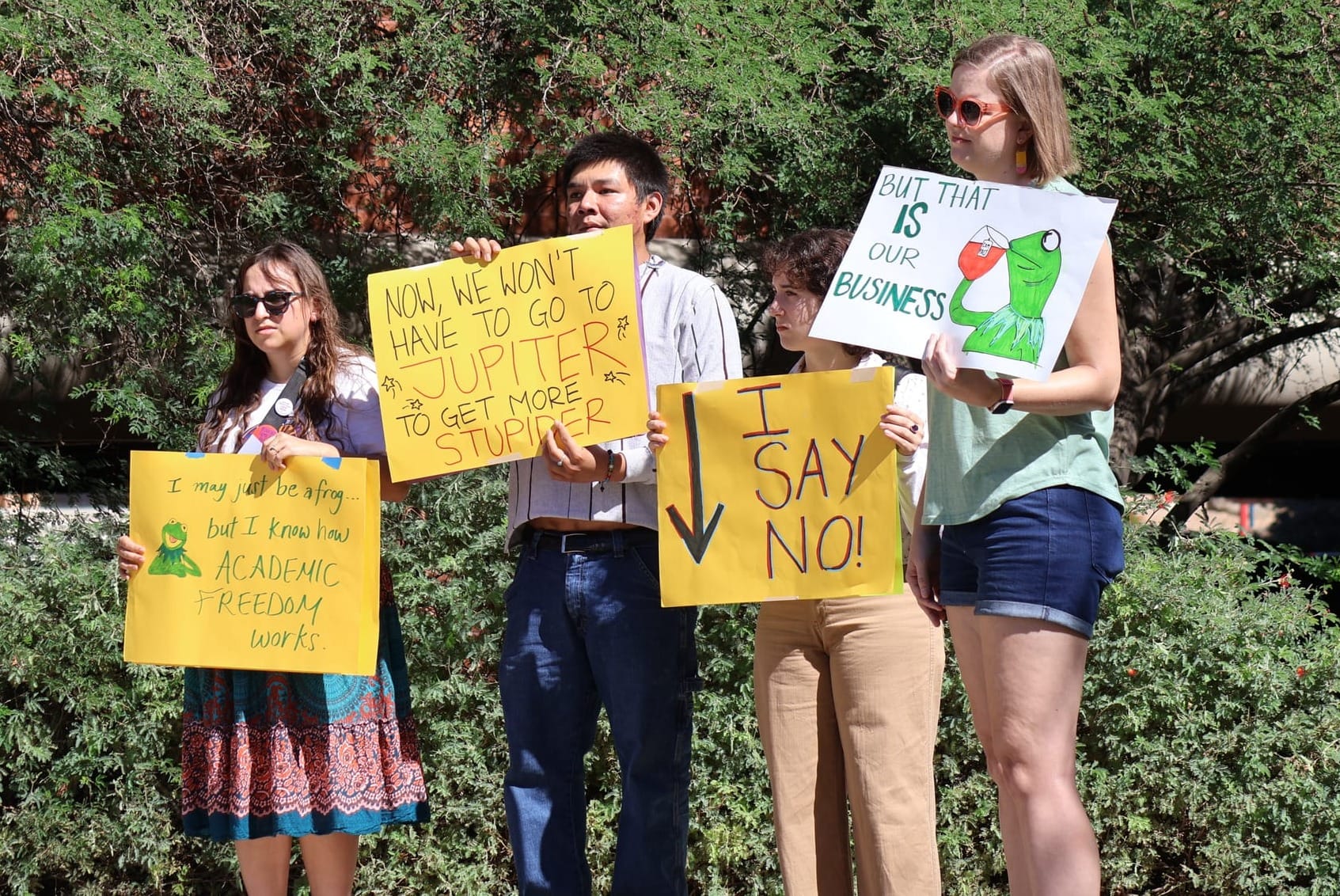
Several speakers complained that the compact is vague, saying it’s hard to determine what exactly the university would be doing.
“The priorities of this letter are as vast as they are vague,” said ASUA Executive Vice President Benjamin Huffman. “To be honest, while I acknowledge that the university and national higher education must do more to attend to the needs of its students, this letter offers very little to the actual problems my classmates would point to as issues that they experience.”
Huffman said some of those issues include safety and job prospects after graduation.
“I urge the university administration to see that signing this agreement would place your ability to serve the needs of your students in the hands of a federal government that is deeply removed from the issues we experience here as the student body,” Huffman said.
On Wednesday, the United Campus Workers Union at the University of Arizona held a teach-in rejecting the compact, providing a space for students, faculty and staff to share information, questions and opinions.
The group published an open letter to Garimella the day before, requesting he reject the compact, saying agreeing to its terms would “allow the federal government to determine which students are admitted, which workers are hired, which courses and programs are offered, and which viewpoints students and workers are allowed to express on campus.”
One major concern about the compact is its approach to free speech on campus. Under the section on “institutional neutrality,” the compact says universities must remain neutral on social and political issues unless directly related to university operations. But several students and faculty members have expressed concerns that the compact could set a precedent limiting speech.
“I’m here because I care deeply about my students, and I always put my students first in my classes. I listen to them, I learn from them,” said Nataly Reed, a senior lecturer in the English Department. “With this compact, we are threatened from having real, honest, exploring conversations that we have in our classes about literature, about writing and about expressing our true selves in the world. This will make us in a state of fear, unable to participate and unable to create.”
Between speakers, attendees of the teach-in broke into chants of “Don’t sign, don’t fold, don’t sign, don’t comply,” and “We want justice, you say how? Hands off our university now.”
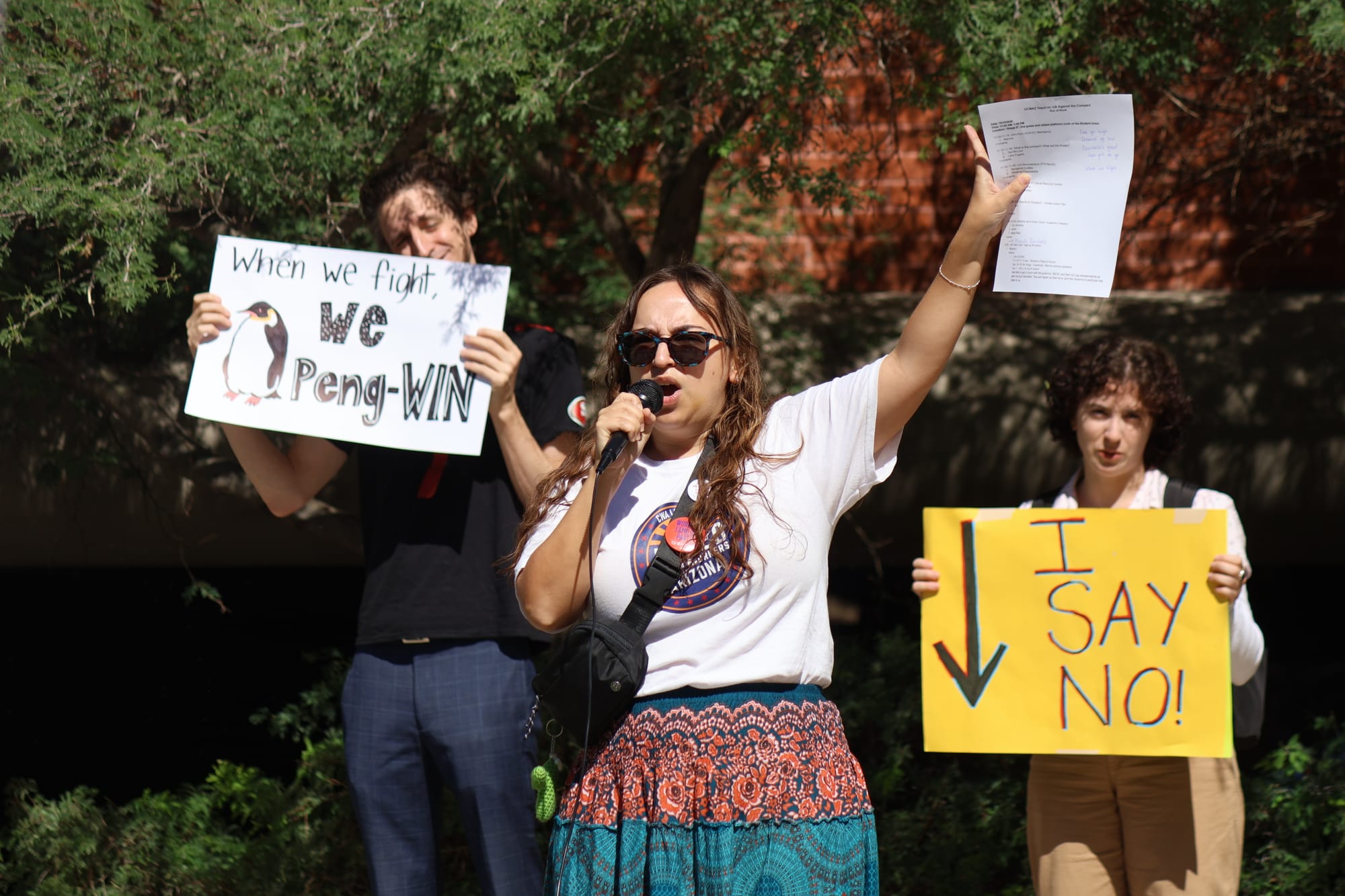
Another major concern among university affiliates is how the compact would impact international students, especially after the university cut ties with its overseas microcampuses and amid fears of students being disregarded.
The compact would limit international student enrollment to 15% overall, with no more than 5% coming from one specific country. It would also require that all international student information be provided to the Department of Homeland Security and the U.S. State Department upon request.
Miranda Pasquarella, a lecturer in the English Department, spent most of last year teaching students at one of the university’s microcampuses in China.
“Students in these joint programs take UA classes with official UA instructors, and they take these classes entirely in English and according to the culture and customs of American academia,” Pasquarella said. “These students are incredibly resilient, hard-working and intelligent.”
The university recently closed four of its microcampuses in China after the federal government cited one as a “national security risk,” affecting more than 2,200 students and 40 faculty and staff members.
“Student success is the North Star of this university, and it promises to welcome every student, support their well-being and sense of belonging, and ensure they have a clear pathway to degree completion and a range of fulfilling career options,” Pasquarella said. “These students had every right to be included in this promise.”
Benjamin Dudley, another lecturer in the English Department, also previously taught students at the international microcampuses.
“These programs were not a danger to America; they were at the forefront of progress,” Dudley said. “They were at the forefront of progress in Chinese-American relations, and they kept us safer because we could talk to each other, because we could exchange culture and get to know a greater perspective for who we are as people.”
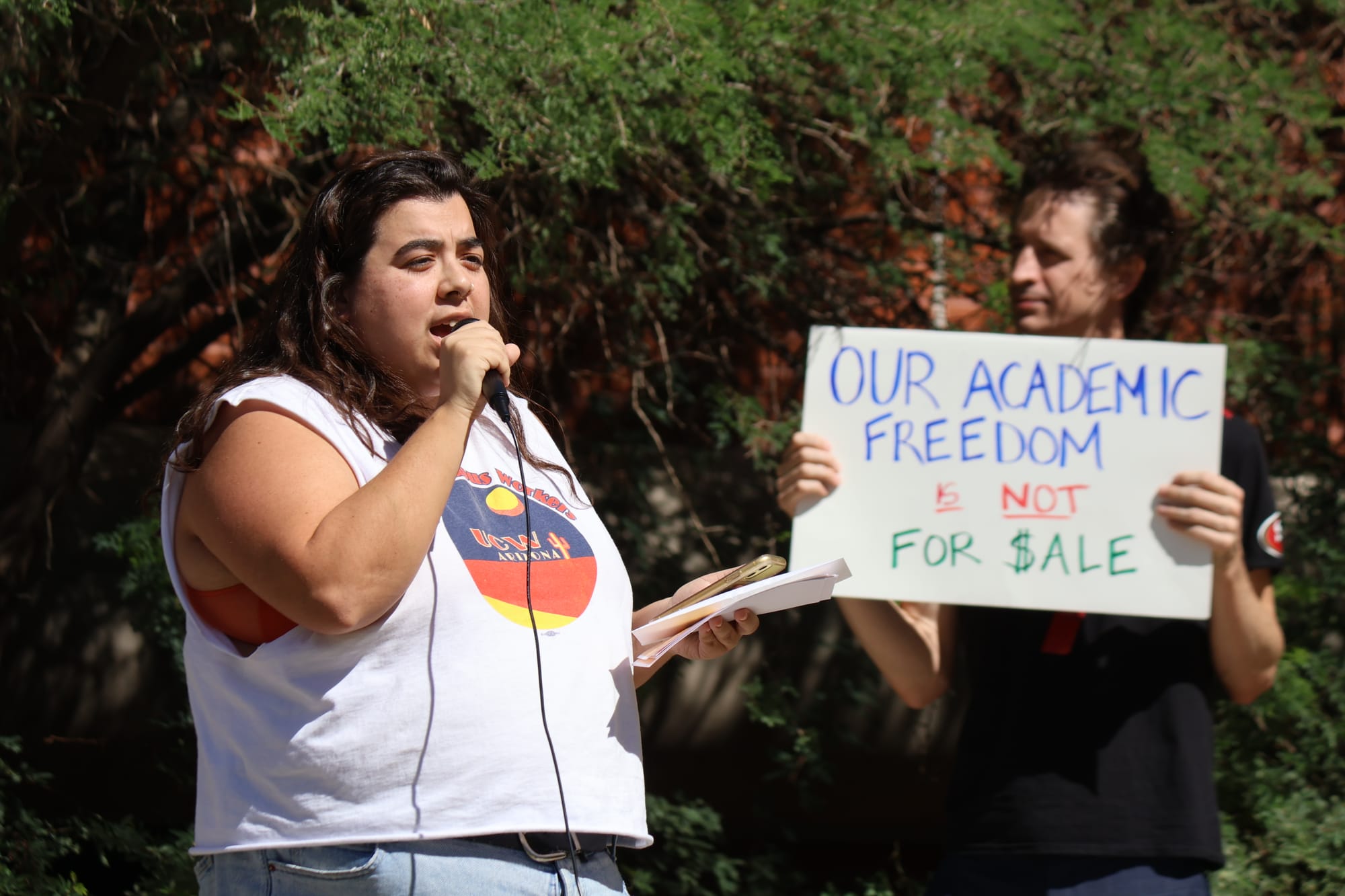
One of the most significant impacts of the compact would fall under “student learning equality,” requiring that all scholarships, programs and facilities be available to all students equally rather than prioritizing those historically marginalized in higher education.
The university recently changed the name of the LGBTQ+ Resource Center to SUMC 404 after federal DEI changes prohibited the word “transgender” in its title, according to Aileen Cerrillos, a center coordinator.
“The attack on cultural centers isn’t new. Cultural resource centers are vestiges and artifacts of the strong campus student-led movements of the 1970s to redistribute university resources to students and groups that have been historically marginalized from higher education,” Cerrillos said.
Tucson City Council Ward 6 candidate Miranda Schubert closed out the event, acknowledging the council’s rejection last week of the compact and emphasizing the importance of maintaining unity in a time of division.
“This compact is about control, and it’s about limiting academic freedom,” Schubert said. “We need to cultivate spaces just like this. We need to cultivate spaces for joy, for sharing information and for continuing to fight back in every single way we possibly can.”
Kristen Godfrey was laid off in July as director of LGBTQ+ Affairs after the UA consolidated its seven cultural resource centers into one centralized hub. A graduate student member of UA Resist, Godfrey said their first reaction to news of the compact was fear.
“I think the administration’s actions from Trump’s inauguration to now have illustrated that they are willing to give up really important values and throw trans people, throw marginalized people under the bus,” Godfrey told Tucson Spotlight.
Godfrey said one positive outcome of the compact has been the way progressive organizations, both on campus and at other universities named in the agreement, have united to push back against it.
“We’ve been in communication with the other schools, and it’s been really beautiful and brilliant to see different organizations around these nine schools working together,” they said.
Emma LaPointe is a journalism, political science and German Studies major at the University of Arizona and Tucson Spotlight intern. Contact her at emma.m.lapointe@gmail.com.
Topacio “Topaz” Servellon is a reporter with Tucson Spotlight. Contact them at topacioserve@gmail.com.
Tucson Spotlight is a community-based newsroom that provides paid opportunities for students and rising journalists in Southern Arizona. Please consider supporting our work with a tax-deductible donation.

